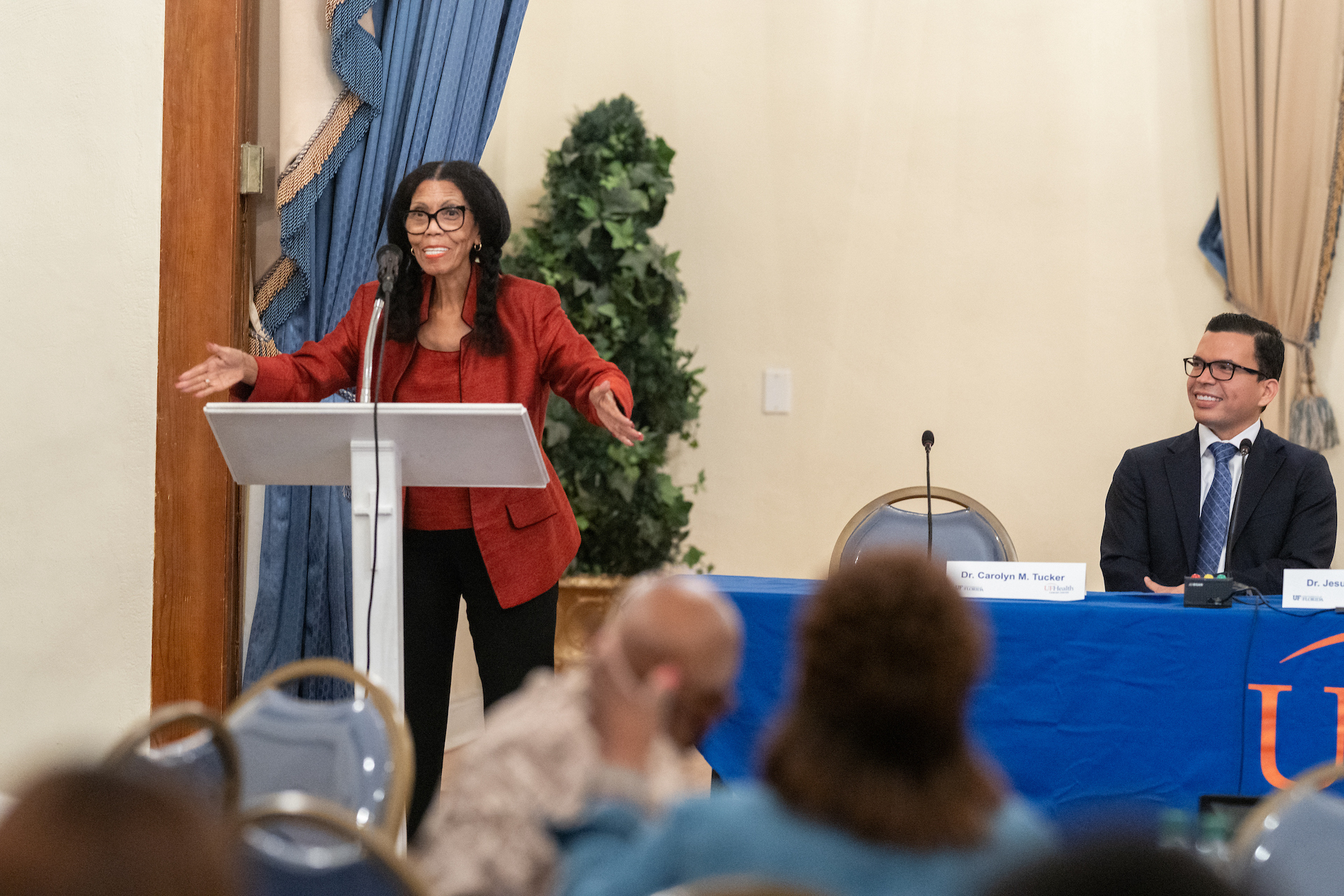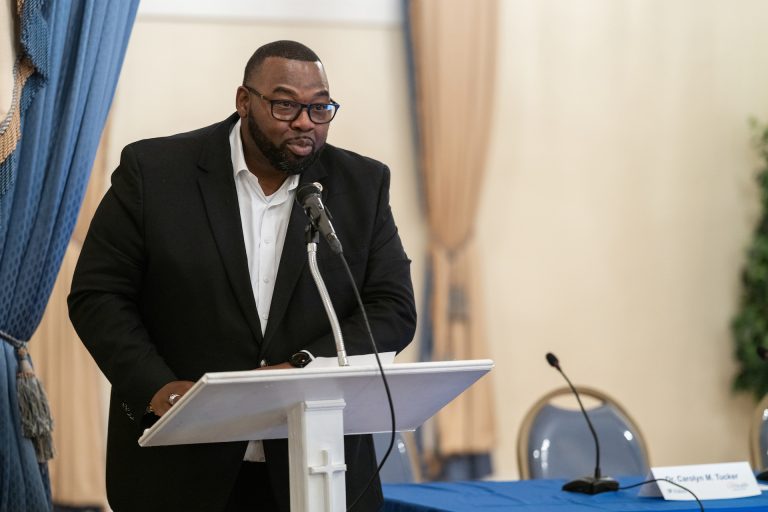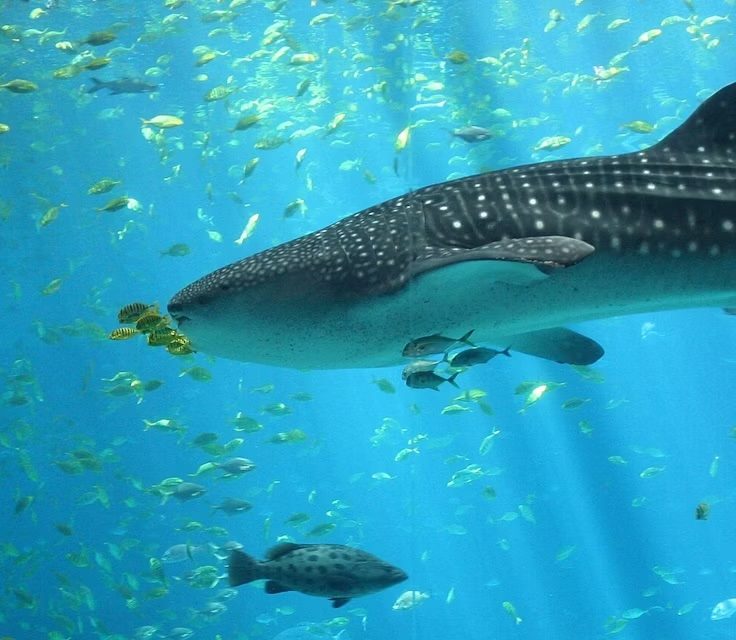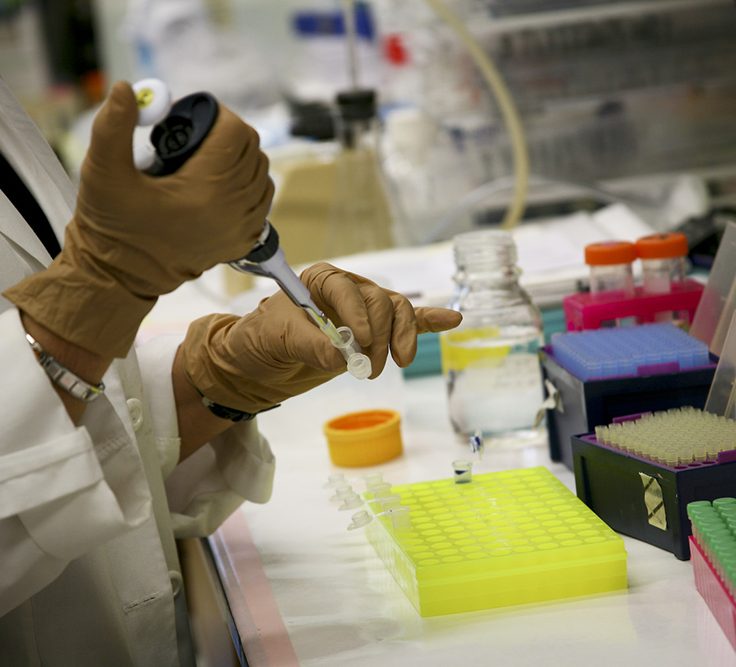
Carolyn Tucker, PhD, who leads the the Tele-Mental Health and Well-Being Support Coaching Program, speaks at a 2022 UF Health Power Over Cancer event. (Photo by Robert Houlihan/UF Health Cancer Center)
In East Gainesville, Community Members Train to Become Mental Health and Well-Being Coaches
University of Florida and Florida Blue Foundation partnership empowers residents to address stress, anxiety, depression, grief, and effective management of anger
In Gainesville’s predominantly Black east side, the availability of mental health services remains scarce even as stress, anxiety, grief, depression, and anger persist among some residents. University of Florida researchers are working to address this disparity by joining with the Florida Blue Foundation and a collaborative of local churches on a new community-centered mental health and well-being program.
Through the initiative, local adults and youth are training to become mental health and well-being support coaches, who will then lead support groups for peers in the community. The team is currently enrolling participants in the support groups — those interested can call 352-294-0652 for more information.
Leading the program is CAROLYN M. TUCKER, PhD, the UF Florida Blue Endowed Chair in Health Disparities Research, a research professor in the Department of Psychology, and the director of the UF Health Cancer Center Community-Partnered Cancer Disparities Research Collaborative and the UF Health Disparities Research and Intervention Program.
Tucker has long worked to expand access to physical and mental health promotion and disease prevention services in underserved communities in Gainesville and Jacksonville by engaging churches and community centers as access partners. Her community-based participatory research and intervention model involves community members and leaders in all aspects of the program.
Tucker’s team has partnered with East Gainesville pastors who have deep ties to their communities and speak to participants from a shared background and perspective. Together, they work to break down cultural stigma around mental health and well-being programs.
“We know that trust in health care providers predicts patients’ utilization of mental health care and the effectiveness of the care they receive,” Tucker said. “We have to provide these community members with access to people who they trust, who are their neighbors, to address myths and misconceptions about counseling and seeking support.”
Pastor Adrian Taylor of Springhill Church noted that it’s common for well-meaning service providers to introduce new programs to underserved areas. But the results are often short-lived because they lack a connection to the community — unlike Tucker’s program.
“By leveraging institutions that have been here and will continue to be here, this program gives people assurance that it will not be a flash in the pan,” Taylor said. Joining Taylor in partnering with Tucker’s team as “pastor-scientists” are Pastor Kenyarda Feathers of Williams Temple Church of God in Christ; Pastor Ron Rawls of Greater Bethel A.M.E. Church; and Pastor Kevin Thorpe of Faith Missionary Baptist Church.
The need to expand mental health services is especially urgent in lower-income areas, which have seen the most severe impacts of the COVID-19 pandemic, leaving residents to deal with increased stress, anxiety and grief on top of continuing economic challenges. According to Tucker, studies have also found that Black adults and youth experience further strains on mental health from persistent racism and social injustice.
Pastor Rawls said he was excited that this partnership would offer a much-needed resource to bring about physical, emotional, psychological and spiritual healing in the community.
“Many in our community have normalized inequitable burdens placed upon us,” he said. “We have learned to smile when we are actually experiencing deep generational pain that reduces the quality of life and eventually causes early death in our village. The church has a role to minister to the needs of the people.”

Funded through a multi-year grant by the Florida Blue Foundation, the Tele-Mental Health and Well-Being Support Coaching Program will prepare 20 adult and 20 youth (ages 16 and 17) community members in East Gainesville as coaches to lead 10-member groups that will total 100 Black adults and 100 Black youth (ages 12-17) each year for three years.
Alongside the University of Florida researchers, community scientists — all members of the partner churches in East Gainesville — will enroll participants and collect data to evaluate the program’s effectiveness. The approach expands upon similar programs that Tucker has launched in Jacksonville, which, in preliminary findings, have shown improvements in participants’ physical and mental health and well-being.
Critical to the program’s success, Tucker said, is the active support from the Florida Blue Foundation, whose representatives will travel to East Gainesville to meet the community members and the UF team and identify ways to support continued progress.
“There’s no health without mental health, but for far too long there has been a stigma around discussions about mental well-being,” said Susan Towler, Florida Blue Foundation executive director. “By training members of a community to provide mental health support at the peer level, we believe that Dr. Tucker’s program at the University of Florida can start to break down barriers to good mental health.”
The program was funded through the Florida Blue Foundation’s 2021 Mental Well-Being Grants, which supports work that takes a holistic approach to address the mental well-being of families and communities.
“I’m really pleased that the Florida Blue Foundation is not just funding the program, but joining with us in partnership with the community to make the program successful,” Tucker said.
With the coach training ongoing, the team is now looking to enroll Black adults and youth (ages 12-17) in East Gainesville to participate in the mental health and well-being support groups, which will take place virtually from Sept. 26 to Dec. 15 this year. Anyone interested in joining or learning more can call Dr. Tucker’s team at 352-294-0652.


